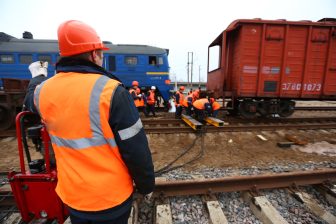International freight trains failed to meet technical standards, say Dutch inspectors
Many international freight trains travelling through The Netherlands last year did not meet the required technical standards, putting rail safety at risk, Dutch transport inspectors say. The Human Environment and Transport Inspectorate’s (ILT) annual report also reveals that it revoked the licence of a freight driver who went through a red signal.
The ILT, part of the Ministry of Agriculture and the Environment, also says there were a number of instances where inspections found the technical condition of other countries’ freight trains was ‘wrong’, and as a result there was a greater risk of derailment and damage to the track infrastructure.
One possibility for this says the ILT was that some trains were being used as an emergency measure for cargo transportation because of a ban on Rhine river traffic, due to low water levels. Because of this extra demand, not enough vehicles conformed to the technical standards.
Suspended
The revocation of the freight train driver’s licence followed an incident on October 14. He was the driver of a service operated by HSL Logistik which went through a red signal between Elst and Nijmegen. The ILT said the train had been travelling from a factory track and came to a stop after 500 metres, and no collision occurred. But as a result the driver’s license was suspended because of doubts over his competence.
The ILT also carried out a number of inspections of trains carrying hazardous materials. Before any railway undertaking is endorsed to carry dangerous goods on its safety certificate in The Netherlands, the ILT assesses whether a company’s internal practices are properly regulated. An environmental permit also applies to the railway yard(s) in which dangerous goods will be shunted. The ILT is responsible for ensuring that such regulations are adhered to, and if anything goes wrong it advises the emergency services about contingency measures.
‘In order’
Some 600 inspections of trains carrying hazardous materials were performed in 2016 and of those, 76 were found to be in the ‘dangerous’ category concerning substances aboard stationary trains in rail yards. There were also 50 inspections of moving trains carrying hazardous goods, and the ILT says the provision of information from the operators relating to these movements was ‘in order’. Every year four million tonnes of dangerous goods are transported via rail freight in The Netherlands, and compliance with the rules was described by ILT as ‘better than in previous years but still not (good) enough’.
The full ILT annual report can be read online (in Dutch).
A correction: The previous image used for this story was a stock photo, and Wascosa was not referred to in the ILT report. We apologise for any indirect link that may have been made.





